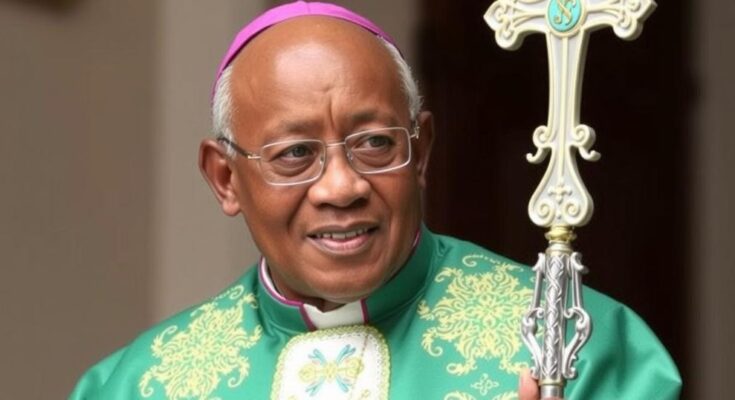Archbishop Kleda of Douala has denounced the lack of genuine democracy in Cameroon, criticizing the electoral system controlled by President Biya. He emphasizes the need for reforms to ensure free elections, echoing sentiments from opposition leaders who call for significant changes to the electoral process. The atmosphere of distrust and allegations of fraud further complicate the political landscape, raising urgent questions about democracy in Cameroon.
In Yaoundé, Cameroon, Archbishop Samuel Kleda of Douala has expressed strong concerns regarding the legitimacy and functionality of democracy in the country. He stated, “Democracy in Cameroon exists in name only; in reality, it doesn’t exist,” highlighting the predictability of election outcomes. With President Paul Biya, the world’s oldest head of state at 91 years, having dominated Cameroonian politics since 1982, Kleda criticized the electoral process and the overseeing body, Elections Cameroon (ELECAM). He emphasized the need for reforms, arguing that major changes must be made to ensure free and fair elections where every candidate has a genuine opportunity to succeed.
Kleda’s statements resonate with political leaders who seek to reform the electoral system. Prince Ekosso, a prominent opposition figure, supports lowering the voting age and advocating for a simplified electoral process. Muma Bih Yvonne of the Social Democratic Front calls for an overhaul of the electoral process to eliminate barriers to voter registration. She emphasized, “I think the electoral code has to be revised,” concerning the necessity for a more accessible voting framework.
The challenges facing Cameroonian democracy include systemic issues such as lengthy election result declarations that allow for potential manipulation by the ruling party, the Cameroon People’s Democratic Movement (CPDM). Political scientists and activists raise alarms about the implications of a lack of transparency, alleging that the CPDM has perfected electoral fraud techniques. The atmosphere of distrust surrounding elections culminates in accusations of rigging following every vote, undermining the sovereignty of democracy in Cameroon.
Kleda’s critique of the electoral integrity calls for immediate reforms that would facilitate a fairer electoral environment in which all political contenders can compete fairly. He stated, “If these conditions are met, we’ll truly see who wins elections in our country,” advocating for a legitimate political landscape free from fraudulent practices and the undue influence of ruling powers.
As the country grapples with numerous socio-economic issues, the quest for true democratic governance remains a pressing concern for many Cameroonians, amid fears that without significant change, actual democratization is unattainable.
Cameroon is witnessing a critical examination of its democratic practices, particularly in light of ongoing leadership by President Paul Biya, who has maintained power for over four decades. Critics, including religious leaders and political figures, question the validity of the electoral process, which is often marred by allegations of fraud and manipulation. The country’s democratization efforts have been further complicated by persistent socio-economic challenges, including widespread poverty and ethnic tensions in its English-speaking regions. As the nation prepares for upcoming elections, calls for appropriate electoral reforms have intensified, reflecting widespread dissatisfaction with the status quo.
In conclusion, the Cameroonian electoral landscape is under intense scrutiny due to allegations of pervasive fraud and the lack of genuine democratic opportunities for candidates. Archbishop Kleda’s statements resonate strongly within a broader call for systemic reforms to ensure electoral integrity. The voices of opposition leaders underscore the need for an electoral process that is not only transparent but also accessible and fair, as Cameroonians seek to achieve authentic democratic governance in a climate rife with skepticism about their leadership.
Original Source: cruxnow.com




